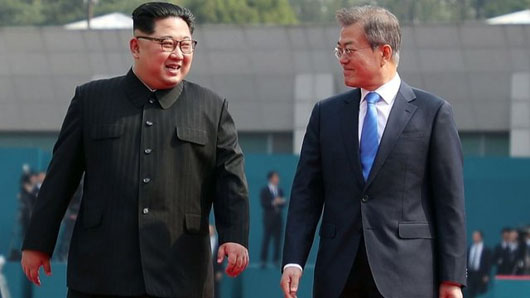by WorldTribune Staff, November 8, 2018
North Korean leader Kim Jong-Un told South Korean President Moon Jae-In during one of their summit meetings that the North was wary of giving up a list of its nuclear arsenal and facilities, fearing it could embolden the Untied States to attack, a South Korean official said.
South Korean national security adviser Chung Eui-Yong quoted Kim Jong-Un as saying to Moon: “Before trust is built up between the U.S. and North Korea, demanding that we give the U.S. a list of our fissile materials, nuclear weapons and delivery systems is the same as telling us to submit a list of targets for attacks.”

Speaking at a National Assembly hearing on Nov. 7, Chung said, “North Korea is aware that reporting a list of its nuclear weapons is a very important step toward denuclearization, but he (Kim) feels the process must come after concrete measures are taken to build up trust by both sides.”
“We are continuing negotiations with related countries to ensure a declaration officially ending the Korean War within this year as promised and we are very open when it comes to the format,” Chung added.
An analysis in the current edition of Geostrategy-Direct warned of increased North Korean influence in Seoul:
“Moon wants Washington to reconsider a speedy transfer of wartime command authority to Seoul most likely to please Kim Jong-Un who is believed by many to have been playing the Korean nationalist card with Seoul to get the U.S. influence out of the Korean Peninsula.
“The timing of such demand certainly detracts from U.S. President Donald Trump’s “Maximum Pressure” approach to force the North Korean dictator to denuclearize.
“By appeasing Pyongyang in a futile bid for peace with the North, Moon has signed a bilateral military pact with Kim to voluntarily disarm along the DMZ. He has also promised Kim substantial economic cooperation and assistance, practically sabotaging the Trump administration’s strategic objective of denuclearization in North Korea.
Related: Seoul seen swayed by North’s nationalism in pressing for wartime command, November 6, 2018
Meanwhile, Moon on Nov. 8 publicly asked the new U.S. Forces Korea (USFK) commander to oversee the transfer of wartime operational control of Korean forces to the host country smoothly, at a change-of-command ceremony.
Army Gen. Robert Abrams replaced Gen. Vincent Brooks as commander of the USFK. The ceremony was held at Camp Humphreys, a U.S. military base in Pyeongtaek, Gyeonggi Province.
“I believe a more stable South Korea-U.S. joint defense posture will be maintained centering on Gen. Abrams,” Moon said. “I ask that (the USFK commander) seeks to push forward with pending tasks such as the transfer of wartime operational control and relocation of the USFK without setbacks, through close consultation.”
South Korean Defense Minister Jeong Kyeong-Doo and Indo-Pacific Commander chief Adm. Philip Davidson were present at the ceremony.
“I am deeply honored to have this opportunity to lead this one-of-a-kind triple-headed command, a unique joint combined force that draws its strength from the ironclad relationship with the Republic of Korea and the commitment of the United Nations,” Abrams said.
Also on Nov. 8, a meeting between U.S. Secretary of State Mike Pompeo top North Korean official Kim Yong-Chol was canceled.
“We will reconvene when our schedules permit,” State Department spokeswoman Heather Nauert said in a statement. “Ongoing conversations continue to take place.”
Moon, South Korea’s liberal president, received a boost in approval ratings from the third inter-Korean summit in mid-September, but they have since dropped back to levels similar to before the summit, according to recent polling data.
A Gallup Korea poll conducted last week showed that Moon’s rating had fallen to 55 percent, and a poll conducted by Realmeter showed near-identical results at 55.6 percent. Moon had previously seen his ratings drop steadily throughout 2018 to a low of 49 percent during the first week of September.
An earlier Gallup Korea survey in October showed that South Koreans remain pessimistic on the state of the economy. The survey found that 54 percent of respondents believed the unemployment rate would increase over the next year and 46 percent indicated that the economy will get worse, compared to only 20 percent of respondents that said the economy will get better.
Subscribe to Geostrategy-Direct __________ Support Free Press Foundation
